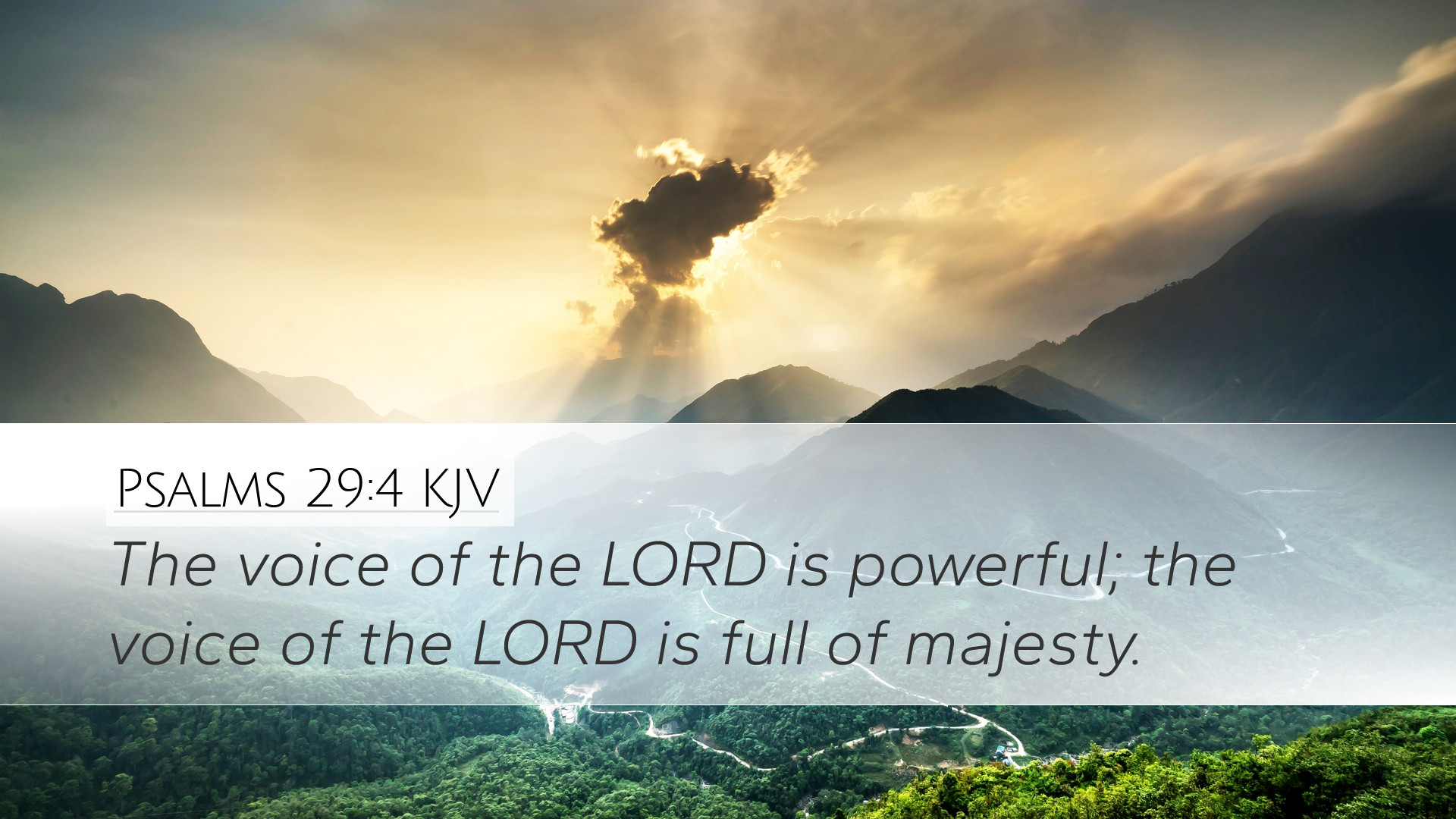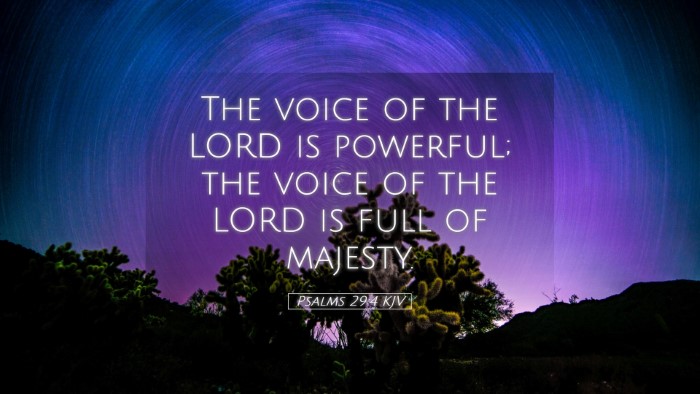Commentary on Psalms 29:4
Psalms 29:4 reads, "The voice of the Lord is powerful; the voice of the Lord is full of majesty."
Overview
This verse is part of a psalm ascribed to David, which celebrates God’s sovereignty and greatness, particularly in His power over creation. The imagery of God's voice evokes a sense of awe and reverence, emphasizing both His authority and magnificence.
Insights from Commentators
Matthew Henry
Divine Authority: Matthew Henry emphasizes that the "voice of the Lord" signifies His authority, which commands and governs all things. The psalmist contrasts God’s voice with the fleeting voices of men. God's voice is not only powerful but also decisive and active in the lives of His people.
Manifestation of Power: Henry observes that the power of God's voice is manifested in nature; it can create, sustain, and destroy. He notes that God’s voice is "like thunder" during storms, representing His ability to instill fear and awe, thereby reminding humanity of their place before the Almighty.
Majesty and Glory: The majesty of God's voice reveals His divine character. Henry points out that this majestical aspect brings comfort to believers, as it assures them of God’s presence and involvement in their lives, particularly in times of trial and uncertainty.
Albert Barnes
Character of God's Voice: Albert Barnes delves into the implications of the dual description of God's voice as “powerful” and “full of majesty.” He notes that power refers to the divine authority that brings things into existence and commands obedience. The majesty speaks to the reverence that one should have towards God.
Impact on Creation: Barnes further explains that God's voice likewise affects creation—shaking the wilderness and making the deer to calve. This reflects the life-giving and sustaining nature of God's word, which governs the natural order and phenomena.
Application for Believers: According to Barnes, understanding the voice of God as both powerful and majestic calls believers to listen attentively and respond appropriately. It challenges them to recognize the importance of God's word in their lives as they engage with scriptures and seek His will.
Adam Clarke
Exegesis of "Voice of the Lord": Adam Clarke analyses the term “voice of the Lord,” stressing that it can represent both direct revelation and the broader communication of God through creation. Clarke emphasizes that God's voice is sovereign and reflects His intricate involvement in the world around us.
Awe and Respect: Clarke highlights the importance of approaching God with awe and respect, meditating on the weightiness of His holiness. The description of God’s voice as majestic calls believers into a deeper understanding of His nature and the need for reverence in worship.
Encouragement for the Faithful: Furthermore, Clarke encourages readers to take heart, for though the world may seem chaotic, the voice of the Lord brings order and assurance. Believers are reminded that God's voice is not only powerful but also protective, guiding them through life's storms.
Theological Implications
This verse serves as a profound reminder of God’s omnipotence and majesty, encapsulating essential theological truths about His nature. When engaged with Psalms 29:4, pastors, students, and scholars are led to consider the following implications:
- God’s Sovereignty: The verse reinforces God's absolute sovereignty over the universe. It invites reflection on how God's voice alone dictates the course of nature and history.
- The Importance of Obedience: Understanding the power behind God's voice urges believers to align their lives with His will, recognizing the authority it carries.
- Worship and Awe: This passage compels a posture of worship that is rooted in awe and reverential fear of God’s majesty, affecting both personal devotion and corporate worship practices.
- Encouragement and Assurance: For those who may feel overwhelmed by life's challenges, encountering the majesty of God's voice offers reassurance that He is present and actively engaged in their circumstances.
Conclusion
Psalms 29:4 stands as a powerful reminder of the majesty and authority of God’s voice. Drawing on insights from Matthew Henry, Albert Barnes, and Adam Clarke enriches the understanding of this verse, offering profound truths applicable for believers today. Engaging with this scripture invites a reflective stance on the nature of God's communication, driving a deeper appreciation for His words as both powerful and majestic.


